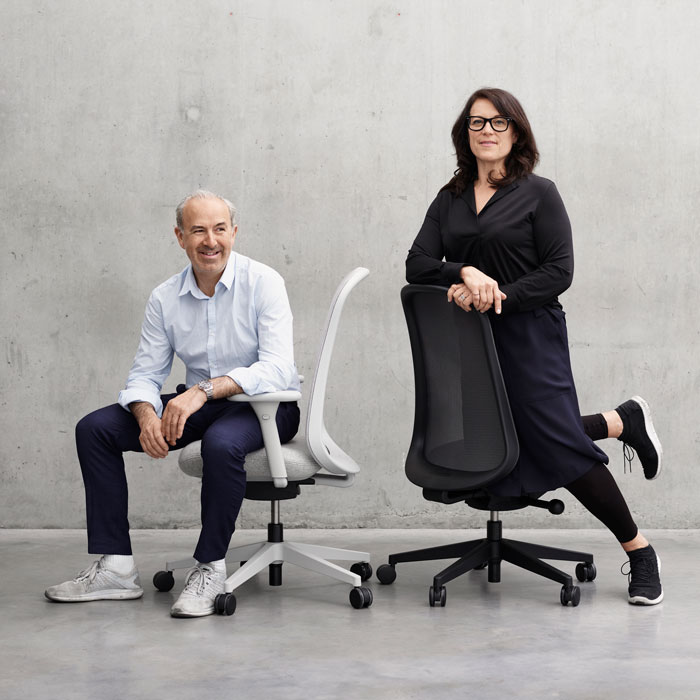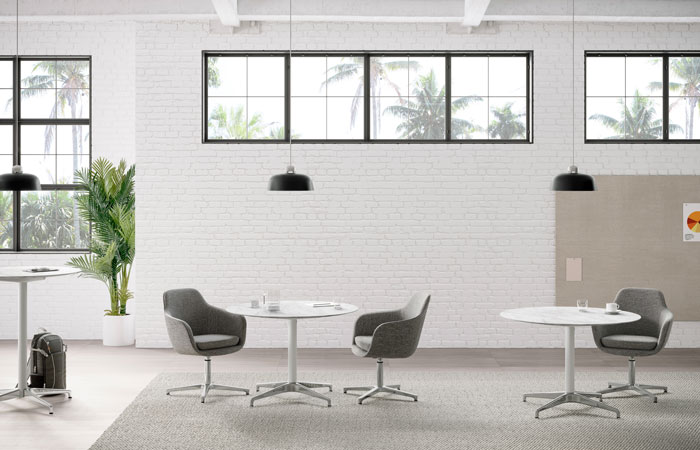Q&A with Sam Hecht and Kim Colin
We were delighted to be invited to talk with London-based designers Sam Hecht and Kim Colin about their thinking on the modern workplace, their approach to design and how it informed their latest products for BCFA member Herman Miller.
Please could you introduce yourselves?
We are Sam Hecht and Kim Colin of London-based studio Industrial Facility. Sam, from London, trained as an industrial designer, while Kim, from Los Angeles, trained as an architect; together we have helped our clients to produce items that display an understanding of both cultural relevance and spatial use.

What is your approach to design?
Our approach reflects both a thoughtful consideration of form and a unique understanding of contemporary life, creating beauty out of utility in the products, furniture and exhibitions they design.
Could you talk our readers through your design process?
Kim Colin
“Each of us is from a different part of the world, and we collaborate constantly about ideas, methods and opinions. Our work is never created in cultural isolation, and therefore our office behaves like a good, condensed international neighbourhood, which is efficient, energetic and pleasurable”.
Sam Hecht
“When we are working through the design process, it is very much a series of conversations. What comes out of it is a sense of equilibrium because the process, the result, is essentially holding those two points of view.”
Why is simplicity of use important in your designs?
For us simplicity of use is important because we want to design products which are relevant and long-lasting. But we don’t want simplicity to be to the detriment of good functionality.

Good functionality is key, can you give us some examples of where this has been achieved particularly successfully?
We aim to design furniture and products that relate to the landscapes where they are used. A great example of this would be Formwork, our desktop storage solution which helps to bring order to papers, tools and artefacts. The shapes and sizes that were rigorously considered to relate an intuitive sense of utility, enabling the accessories may be stacked and combined in any way necessary.
Could you tell us about your latest designs for Herman Miller?
Civic is a new table program that addresses some of the important aspects of the modern office – and also the modern home – which are these days so utterly intertwined in how we expect to be. The office is seeing a rise in the needs for agility and transformation of spaces, along with the need to create an identity that is particular to an organisation. Civic tables have a base structure that can be small or enlarged, and allows a multitude of different surfaces, materials and shapes that can be accommodated – all on glides or castors. It means from a single table structure, different styles and functions from cafe tables, to conference rooms, can hold their own identity while also keeping a level of congruity.

We are also launching a new work-chair called Lino that is uncommonly affordable – all of the years of knowledge for technical, comfort and support has been married with a soft and approachable design that appears balanced and simple to the eye – with a price that is surprisingly affordable. It’s a more a piece of furniture that a machine.

How do these designs reflect the needs of the modern workplace?
The modern world offers almost endless possibilities, and with Civic we wanted to find some quiet within that noise. The Civic table programme is an elegant, comprehensive design that has been created to facilitate harmony in the workplace while also balancing the need for furniture to provide a unique identity for each client.
How have you addressed sustainability within your work for Herman Miller?
Sustainability as defined by us, is the ability to sustain the economy of means without damaging the planet. The first rule of thumb is that these designs, along with all of Herman Miller’s work, is engineered to last. Lino comes with an industry-beating 12-year warranty. And design also makes sure that these products are not fashionable but will blend into environments beautifully, so we are happy for them to stick around. The materials are also carefully considered – recycled aluminium is used for the base of Civic, and Lino can be recycled.
Contact Herman Miller




